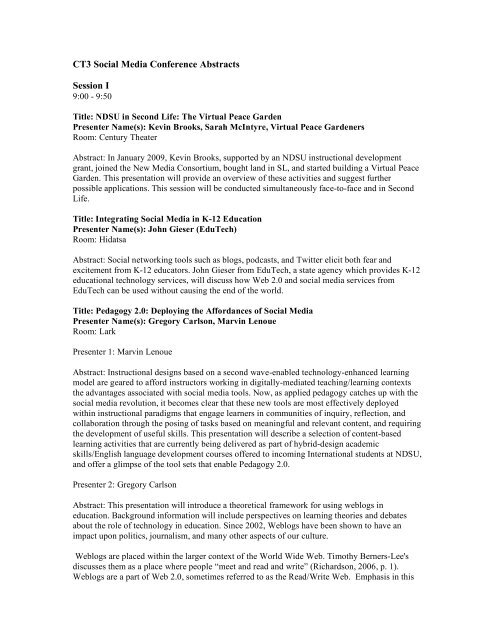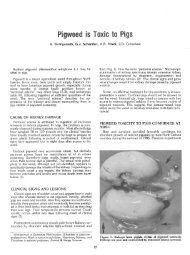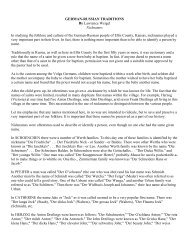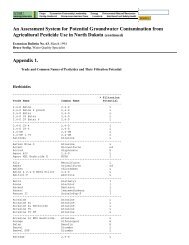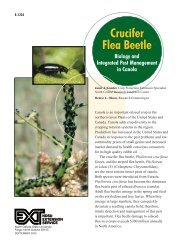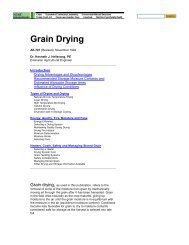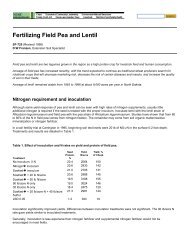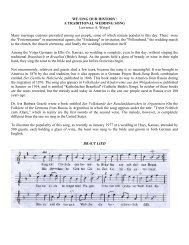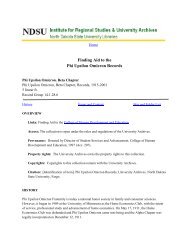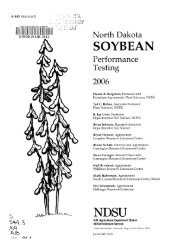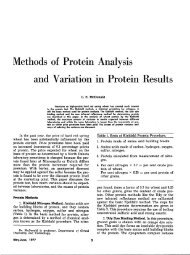CT3 Social Media Conference Abstracts Session I - Libraries
CT3 Social Media Conference Abstracts Session I - Libraries
CT3 Social Media Conference Abstracts Session I - Libraries
Create successful ePaper yourself
Turn your PDF publications into a flip-book with our unique Google optimized e-Paper software.
<strong>CT3</strong> <strong>Social</strong> <strong>Media</strong> <strong>Conference</strong> <strong>Abstracts</strong><br />
<strong>Session</strong> I<br />
9:00 - 9:50<br />
Title: NDSU in Second Life: The Virtual Peace Garden<br />
Presenter Name(s): Kevin Brooks, Sarah McIntyre, Virtual Peace Gardeners<br />
Room: Century Theater<br />
Abstract: In January 2009, Kevin Brooks, supported by an NDSU instructional development<br />
grant, joined the New <strong>Media</strong> Consortium, bought land in SL, and started building a Virtual Peace<br />
Garden. This presentation will provide an overview of these activities and suggest further<br />
possible applications. This session will be conducted simultaneously face-to-face and in Second<br />
Life.<br />
Title: Integrating <strong>Social</strong> <strong>Media</strong> in K-12 Education<br />
Presenter Name(s): John Gieser (EduTech)<br />
Room: Hidatsa<br />
Abstract: <strong>Social</strong> networking tools such as blogs, podcasts, and Twitter elicit both fear and<br />
excitement from K-12 educators. John Gieser from EduTech, a state agency which provides K-12<br />
educational technology services, will discuss how Web 2.0 and social media services from<br />
EduTech can be used without causing the end of the world.<br />
Title: Pedagogy 2.0: Deploying the Affordances of <strong>Social</strong> <strong>Media</strong><br />
Presenter Name(s): Gregory Carlson, Marvin Lenoue<br />
Room: Lark<br />
Presenter 1: Marvin Lenoue<br />
Abstract: Instructional designs based on a second wave-enabled technology-enhanced learning<br />
model are geared to afford instructors working in digitally-mediated teaching/learning contexts<br />
the advantages associated with social media tools. Now, as applied pedagogy catches up with the<br />
social media revolution, it becomes clear that these new tools are most effectively deployed<br />
within instructional paradigms that engage learners in communities of inquiry, reflection, and<br />
collaboration through the posing of tasks based on meaningful and relevant content, and requiring<br />
the development of useful skills. This presentation will describe a selection of content-based<br />
learning activities that are currently being delivered as part of hybrid-design academic<br />
skills/English language development courses offered to incoming International students at NDSU,<br />
and offer a glimpse of the tool sets that enable Pedagogy 2.0.<br />
Presenter 2: Gregory Carlson<br />
Abstract: This presentation will introduce a theoretical framework for using weblogs in<br />
education. Background information will include perspectives on learning theories and debates<br />
about the role of technology in education. Since 2002, Weblogs have been shown to have an<br />
impact upon politics, journalism, and many other aspects of our culture.<br />
Weblogs are placed within the larger context of the World Wide Web. Timothy Berners-Lee's<br />
discusses them as a place where people “meet and read and write” (Richardson, 2006, p. 1).<br />
Weblogs are a part of Web 2.0, sometimes referred to as the Read/Write Web. Emphasis in this
presentation is placed upon weblog applications within education by institutions, administrators,<br />
instructors, and students inside and outside of the classroom. Scholarship on the effectiveness of<br />
weblogs as educational tools will be highlighted. This framework will serve as part of a larger<br />
project on the integration of weblogs into instruction by Dr. Enger at NDSU to enhance reflection<br />
and promote transformational learning at the doctoral level.<br />
Title: Blogging as an Evaluation and Storytelling Tool<br />
Presenter Name(s): Jodi Burns for Lynette Flage<br />
Room: Mandan<br />
Abstract: Horizons is an 18-month community program supported by NDSU Extension and is<br />
designed to develop local rural leaders to address difficult issues such as poverty and<br />
demographic decline. Blogging is used as a programmatic tool in the North Dakota Horizons<br />
program to tell their community story. Community members are asked to blog about progress<br />
made in Horizons and the overall goals of this blogging effort include:<br />
• To build capacity of communities to be reflective and evaluate their progress<br />
• To reinforce program outcomes and help keep the focus on poverty, leadership and<br />
community<br />
• To help communities maintain a history of the project. This will help remember how far<br />
they have come and successes along the way.<br />
• To help communities communicate internally about Horizons progress, decisions about<br />
issues and other things in their communities. It is a way to tell the community story.<br />
Title: Using Second Life in an Educational Setting<br />
Presenter Name: Dr. Michael L. Ruth<br />
Room: Meadow<br />
Abstract: Virtual environments have been in the news and the subject of certain TV episodes<br />
lately and they have caught the eye of faculty and administrators across the country. How does<br />
using Second Life (SL) or other virtual environments effect learning Is it a game, a large chat<br />
room or is it a viable learning and marketing tool How does it work and what are the advantages<br />
and disadvantages of SL We will review and critique different university's SL sites.<br />
<strong>Session</strong> II<br />
10:10 - 11:00<br />
Title: <strong>Social</strong> <strong>Media</strong> and Public Writing<br />
Presenter Name(s): Carrie Anne Platt, Andrew Mara<br />
Room: Arikara<br />
Abstract: This panel explores the pedagogical value of blogging in both undergraduate and<br />
graduate level humanities courses. Using several courses at NDSU as case studies, the speakers<br />
will address the positive and negative outcomes that can result from incorporating blogging into<br />
the curriculum. As the case studies presented will illustrate, “writing in public” has the potential<br />
to increase student engagement, improve the quality of student writing, facilitate peer-to-peer<br />
learning, make the connection between theory and practice more concrete, and help students<br />
develop necessary levels of multi-media literacy. After considering the pedagogical outcomes of<br />
blogging in these courses, along with student feedback on their own blogging experiences, the<br />
panel outlines a set of best practices for the educational use of this social media technology.
Title: Cooperative Extension in Second Life<br />
Presenter Name(s): Bob Bertsch<br />
Room: Century Theater<br />
Abstract: Bob Bertsch and his Second Life avatar McLuhan Darkfold will lead a tour of the<br />
Morrill Island, the home for cooperative extension in Second Life. Morrill Island and associated<br />
Second Life locations were created through the collaborative efforts of land-grant university<br />
faculty and staff, coordinated by extension. Morrill Island seeks to extend cooperative extensions<br />
into a virtual environment. The island is home to extension's Virtual State Fair. There are rides,<br />
games and a number of educational displays on the fairgrounds. The educational exhibits include<br />
the Family Caregiving CoP "Live-ability House", The Turf Grass Big Backyard from Penn State,<br />
a huge Food Pyramid and the House of Germs. This session will be conducted simultaneously<br />
face-to-face and in Second Life.<br />
Title: Web Video Conferencing the Wimba Way<br />
Presenter Name(s): Lyn DeLorme, Jerry Olson, and Elango Murugaiyan<br />
Room: Hidasta<br />
Abstract: The Wimba Collaboration Suite includes a virtual classroom - live voice and video at a<br />
distance - and also podcasting capability, voice discussion, and instant messaging features that are<br />
integrated with Blackboard in a familiar, easy-to-use interface. The Wimba system became<br />
available to NDSU faculty last year, and has already had a dramatic impact on some of the<br />
classrooms at NDSU.<br />
Participants in this session will have the opportunity to see a live demonstration of the Wimba<br />
Classroom features - which include chat, live voice and video. Additionally, participants will hear<br />
about how colleagues at NDSU are using Wimba in surprising and innovative ways to shape their<br />
teaching and learning environments.<br />
Title: Immersive Learning Environments: What We've Learned<br />
Presenter Name(s): Phillip McClean, Brian Slator, Christina Johnson<br />
Room: Lark<br />
Abstract: The NDSU World Wide Web Instructional Committee has a long history of developing<br />
immersive learning environments for education. This began with the pioneering work on the<br />
Dollar Bay retailing game. Subsequently, other learning environments such as Geology Explorer,<br />
that teaches principles of geology, and the Virtual Cell, the focuses on molecular and<br />
cellular biology topics, were developed. Large scale experiments were performed that<br />
demonstrate that these environments have a positive impact on student learning. This<br />
presentation will discuss issues related to the conceptualization, design, implementation, testing,<br />
and dissemination of these environments.<br />
Title: A Glogging We Will Go: Using Web 2.0 Technologies to Build Classroom<br />
Communities<br />
Presenter Name(s): Melissa Vosen and Jennie Enger<br />
Room: Meadow<br />
Presenter 1: Melissa Vosen<br />
Abstract: More and more universities are encouraging faculty members to incorporate<br />
collaboration into their classrooms because students are often required to collaborate in the<br />
workforce—not to mention the personal benefits of collaboration: building relationships and
gaining a better understanding of the course material. In order for a collaborative project to be<br />
successful, students need to feel accountable to their classmates and to feel as though they are<br />
part of a team, a community. Web 2.0 technologies, technologies that are becoming more<br />
prevalent in our classrooms, can help students construct personal and professional relationships<br />
and build classroom communities. Vosen will share how Web 2.0 technologies can help build<br />
classroom communities. By building communities, students are able to develop personal and<br />
professional relationships, leading to an increased desire to work collaboratively and, ultimately,<br />
a successful collaborative experience. Vosen will share several assignments that can be used in<br />
any classroom to help students get to know their peers, setting the foundation for collaborative<br />
projects. Vosen will examine the use of glogs, blogs, and Facebook.<br />
Presenter 2: Jennie Enger<br />
Abstract: Recent studies such as Scholastic’s “2008 Kids and Family Reading Report” reveal that<br />
students value technology and extend their reading experiences using the Internet. Therefore, we<br />
as educators need to promote reading through our students’ interest in technology. In a pilot<br />
study conducted at the University of Liverpool, researchers found that using social bookmarking<br />
sites helped college students develop critical reading and information literacy and management<br />
skills. Since my first year English students also struggle with these skills, I adapted the<br />
researchers’ ideas for social bookmarking to meet my students’ needs by creating a series of<br />
lessons and assignments which use the sites Reframe It and Delicious to teach critical reading and<br />
annotation skills as well as information management skills and more general concepts such as<br />
audience, genre, research strategies, and collaboration.<br />
Keynote Presentation<br />
11:20-12:10<br />
Room: Century Theater<br />
Title: Algorithmic Architecture: Designing Immersive Interaction Spaces<br />
Presenter Name: Drew Harry<br />
Abstract: Immersive virtual worlds hold significant promise for connecting distant teachers and<br />
learners. But we are also faced with a challenge: how do we build effective virtual learning<br />
spaces When should we use familiar physical designs and when should we diverge and take<br />
advantage of the unique characteristics of virtual worlds Through the lens of my work designing<br />
immersive spaces for a variety of uses, I will show how virtual spaces give us the tools to imagine<br />
new interactions for teaching, and describe a critical vocabulary for thinking about what teaching<br />
activities make sense in immersive spaces and what might make more sense in other<br />
environments.<br />
<strong>Session</strong> III<br />
2:00 - 2:50<br />
Room: Century Theater<br />
Title: Second Life State Fair<br />
Presenter Name(s): Rich Mattern, Erin (SL Name), and Satin (SL Name)<br />
Room: Century Theater<br />
Abstract: Land-grant universities, including NDSU, have invested time, expertise and money in<br />
developing a presence on Second Life.
One such presence is a virtual state fair. Information on topics, such as horticulture, livestock<br />
management and finances, are available at the fair. However, it is not all serious business. You<br />
can ride a Ferris wheel, play games and even dance. For this presentation, I will take the audience<br />
on a tour of the virtual fair and show how Second Life is integrated with some of our NDSU Web<br />
sites when SLers seek information. I will also introduce you to Erin and Satin, Second Life<br />
entertainers based out of Milwaukee, Wis. They will discuss how they became interested in<br />
singing in Second Life how it can be profitable. Erin also has developed building skills in Second<br />
Life and will talk about some of the houses she has built, including the Second Life home they<br />
live in.<br />
Title: "Virtual Border Crossings"<br />
Presenter Name(s): Kathy Enger, Marvin LeNoue, and Lyn DeLorme<br />
Room: Hidatsa<br />
Abstract: This session is about technology-enhanced learning delivery methods framed within<br />
contexts that address adult and multicultural education issues, along with an examination of<br />
diverse and cross-cultural perspectives on teaching and learning. The focus will be on helping<br />
online educators adapt their courses to an environment of increased cultural and racial diversity in<br />
ways that promote cultural awareness and intercultural competence in learners. Participants will<br />
learn how second-wave, technology-enhanced courses can meet the needs of diverse student<br />
populations worldwide and will explore methods for countering such long-standing distance<br />
education issues as student isolation, lack of motivation or engagement, and practical difficulties<br />
with day-to-day course administration.<br />
Title: Changing the Landscape of Scholarly Communication : NDSU Digital Commons Pilot<br />
project<br />
Presenter Name(s): Karen Bjork<br />
Room: Lark<br />
Abstract: Come and learn about North Dakota State University's digital repository. Digital<br />
Commons@NDSU is a project provided by the NDSU <strong>Libraries</strong> that collects, preserves, and<br />
distributes digital material (born or created) located at or produced by the NDSU community. It is<br />
part of an open access initiative fueled to increase the visibility of NDSU scholarship. The session<br />
will provide a brief overview of the project and explore how faculty, students, and staff can<br />
contribute to the ongoing development of new knowledge.<br />
Title: <strong>Social</strong> <strong>Media</strong> Research Poster Presentation<br />
Presenter Name(s): Intro to Writing Class (English 275)<br />
Room: Mandan<br />
Abstract: An Introduction to Writing Studies undergraduate class shares their early-semester<br />
research on social media and writing practices.
<strong>Session</strong> IV<br />
3:10 – 4:00<br />
Title: Part II Second Life State Fair<br />
Presenter Name(s): Rich Mattern, Erin (SL Name), and Satin (SL Name)<br />
Room: Century Theater<br />
Abstract: Land-grant universities, including NDSU, have invested time, expertise and money in<br />
developing a presence on Second Life.<br />
One such presence is a virtual state fair. Information on topics, such as horticulture, livestock<br />
management and finances, are available at the fair. However, it is not all serious business. You<br />
can ride a Ferris wheel, play games and even dance. For this presentation, I will take the audience<br />
on a tour of the virtual fair and show how Second Life is integrated with some of our NDSU Web<br />
sites when SLers seek information. I will also introduce you to Erin and Satin, Second Life<br />
entertainers based out of Milwaukee, Wis. They will discuss how they became interested in<br />
singing in Second Life how it can be profitable. Erin also has developed building skills in Second<br />
Life and will talk about some of the houses she has built, including the Second Life home they<br />
live in.<br />
Title: Podcasting is Yummy<br />
Presenter Name(s): Nem Schlecht<br />
Room: Hidatsa<br />
Abstract: Podcasting is one of the newer content delivery methods available today. Have you<br />
ever watched a talk show and thought to yourself, "I can do that!" Have you ever thought about<br />
recording your lectures and creating an online course with them Podcasting involves several<br />
media types, although the focus is usually on audio, that can be easily subscribed to and<br />
automatically updated. Join us and find out<br />
how to find podcasts that you are interested in and how to go about starting up your very own<br />
podcast.<br />
Title: <strong>Social</strong> <strong>Media</strong> Appearances, <strong>Social</strong> <strong>Media</strong> Realities<br />
Presenter Name(s): Andrew Mara, Martha Bartels and Matthew Pullen<br />
Room: Lark<br />
Abstract: The members of this panel will examine three ways that social media are portrayed<br />
differently than how they operate in practice. Speaker 1 will explore the confusing nature of<br />
copyright and fair-use through a comparison study of how copyright lawsuit practices differ from<br />
media portrayals of piracy crackdowns. Speaker 2 will discuss the gap between media portayals<br />
of social media as a dangerous vanity practice, and the use of social media as a nonprofit research<br />
resource. Finally, speaker 3 will describe how social media can short circuit plagiarism panic by<br />
reframing plagiarism as both necessary as an academic step and irrelevant as an evaluative<br />
measure.
Title: Between Action-based Research and Service Learning: The MEmorial as Community<br />
Building Genre<br />
Presenter Name(s):Kevin Brooks, Landon Kafka, Erik Kornkven, Niles Haich<br />
Room: Mandan<br />
Abstract: This panel will consist of presentation by three MEmorialists, explorers of Gregory<br />
Ulmer's electrate genre, the MEmorial. “A MEmorial begins in the form and style of the<br />
proposal" Ulmer says. "It has a certain ‘as if’ quality of speculation. The design is described and<br />
contextualized in a rationale such that it does not depend on the acceptance of the plan in order<br />
for the idea to influence its intended audience” (p. 33). A MEmorial, Ulmer suggests, can be<br />
divided into two parts—the peripheral, the thing that is attached (or proposed to be attached) to an<br />
existing monument, and the testimonial—likely (but not necessarily) a website describing the<br />
peripheral, its rationale, and its intended function (p. 63). Because the genre is intended to raise<br />
public consciousness or awareness of neglected issues, and perhaps generate social action, the<br />
MEmorialists considered where this genre might fit on a pedagogical spectrum that includes the<br />
traditional argumentative essay, action-based research and service learning. The MEmorialists<br />
will provide a short walk-though of their projects, and then discuss where they see their work<br />
fitting on that spectrum.<br />
Title: Rolling Out Content Management Systems and Courseware in Institutional Settings<br />
Presenter Name(s): Nancy Lilleberg and Richard Frovarp<br />
Room: Meadow<br />
Abstract: Blackboard is critical at North Dakota State University with a large majority of faculty<br />
using the system to manage their courses. If a faculty member doesn't use Blackboard, it is<br />
common for the students of the class to ask why he/she doesn't. Similar to viewing "the tip of the<br />
iceberg," the user's view of Blackboard is just a small part of what is involved in offering a<br />
Content Management System for courseware. During this session, Richard Frovarp will share<br />
what goes on "behind the scenes" from the application development and server viewpoint, and<br />
Nancy Lilleberg will share how the Instructional Services team supports faculty and students in<br />
the use of Blackboard.


